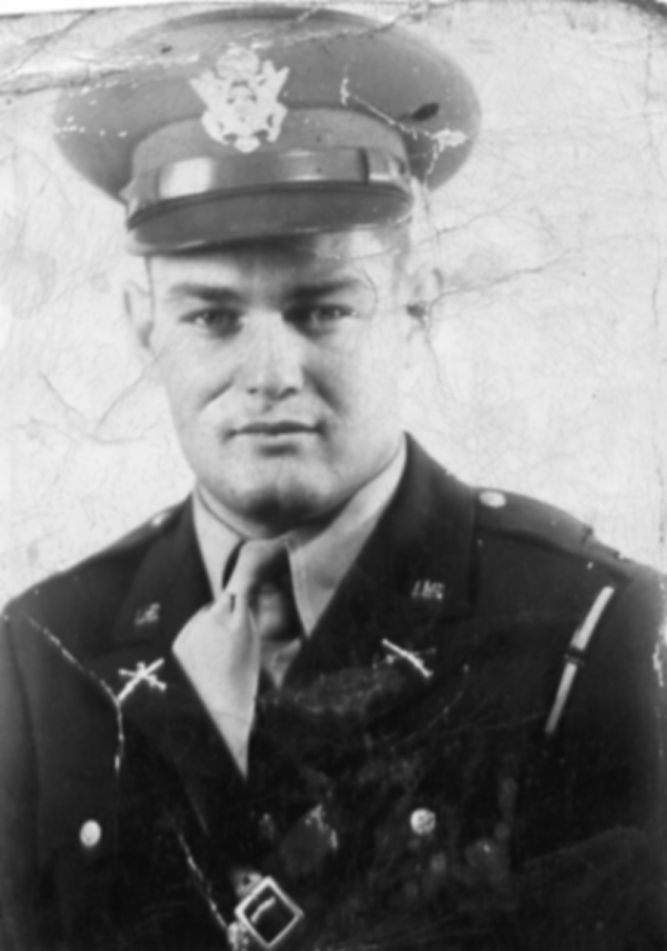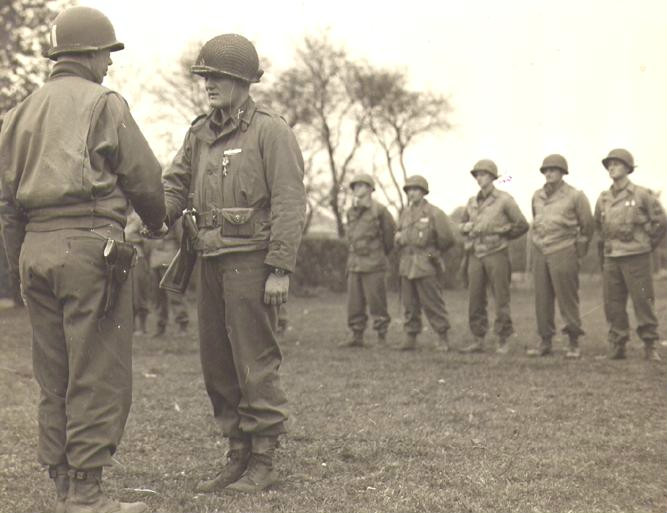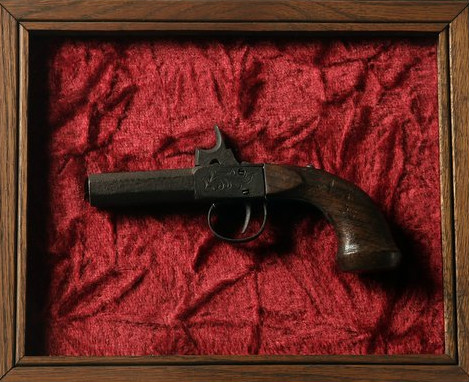World War II Promise Fulfilled, Some 67 Years Later
July 5, 2011
Posted in 358th Infantry, 90th Infantry Division, Bootprints, Robert McHolland, World War II
Tags: 358th Infantry, 90th Infantry Division, Bootprints, Robert McHolland, World War II
Captain Robert McHolland commanded K Company, 358th Infantry, 90th Infantry Division, during World War II. McHolland and his unit, better known as the “Kraut Killers”, fought in Patton’s Third Army across Northern Europe.
Along the way, McHolland picked up an antique French pistol for a friend back home. Prior to war, though he lived in Missouri, McHolland often visited his aunt and uncle in Claremore, Oklahoma. They lived near the old Mason Hotel. The proprietor of the hotel, J.M. Davis, was also the town’s mayor, and an avid gun collector. Throughout the establishment, Mr. Davis proudly displayed his vast arms collection.
“Tell the mayor of Claremore I have a very antique French pistol I’m saving for his collection of guns,” McHolland wrote to his aunt and uncle in 1944 from the front. “I’ve carried it all over France, but I can’t mail it home because you can’t mail firearms, even it it is too old and rusty to fire anymore.”
In late November 1944, McHolland and his unit found themselves holed up and surrounded in the tiny burg of Butzdorf, Germany. Best friend, Howard Pemberton, and about a dozen other American soldiers filled one of the last safe houses in town.
“It was decided that I was going to go get help,” Pemberton relived, in the book, BOOTPRINTS. “I was just getting ready to leave. Captain McHolland was the doorman. Then we heard a guy trying to yell quietly, but still be heard, ‘K! K! K! K Company!’ as he ran alongside the shed toward the door. When McHolland opened it to let this guy in, an enemy machine gunner cut the Captain down, right in front of me. There was nothing we could do for him. McHolland was dead and I never made it out the door.”
Though Pemberton would receive the Silver Star for his heroics at the battle, it’s to his fallen friend, McHolland, that his mind returns to most. “…The night before we went to Butzdorf, we walked through the woods together. … I could see the fatigue in his eyes. I tried to get him to go back for a rest, but I knew he would never do it. … He was one of the finest people I ever met.”
None felt the loss more than his family. “I was only three years old, but I remember Robert,” beamed his nephew, Jerry Wiley. “On what was apparently his last leave … I recall him taking my younger brother, Bob, and me somewhere to get candy and ice cream. I also recall being at our home in Hurley one night and him teasing and scaring us with his stories about the bears and lions outside the windows. … He delighted in teasing everyone he knew.
“The most vivid early memory I have, and probably the one that has most affected my life, is the day in December 1944 when my mother received the telegram informing her that Robert was missing in action. The specific thing I remember is her calling her half-sister, Anna Hill, in Texas to tell her of the news. I remember her trying to talk through the sobs and tears on the old wall telephone we had in our home. I was very young, but I knew something was very wrong because my mother couldn’t stop crying.
“Uncle Bob was my hero, all the while I was growing up. Many times I poured over the scrapbook my mother and aunt kept with clippings, pictures, and letters from and about him. … Over the years, I came to know how much his family and friends thought of him. I guess, maybe, that’s why he became, in absentia, my role model. I chose Army ROTC and served in the Infantry and wore his Infantry ‘crossed rifles’ insignia and Captain’s bars when I was on active duty.”
Wiley’s commitment to his fallen uncle would not end there. He recently completed a biography entitled, Captain Mac: War Hero, My Hero.
In researching for the book, Wiley came across the long lost letter from McHolland to his aunt and uncle in Claremore. The antique French pistol had been returned to the family with the Captain’s belongings at the time of his death. In fact, it had been nicely encased and was in the possession of Wiley himself. With a little digging, he soon found that though the hotel owner had passed away long ago, his collection was very much alive and well. The J.M. Davis Arms and Historical Museum had gone public. Turning the gun over in June to Executive Director, Wayne McCombs, Wiley fulfilled a promise made some 67 years ago, and taken one more step in honoring the memory of his hero, Uncle Bob.




Incredible story.
Jerry and you Mike are both doing an awesome work for History.
Thanks.
Best regards from Normandy!